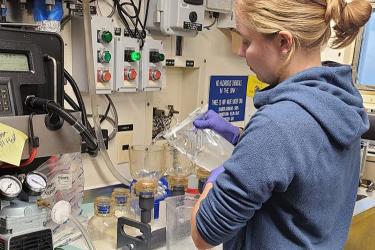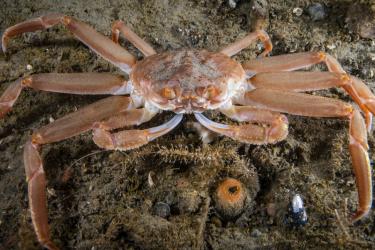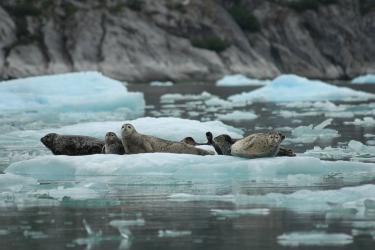Andrew Munro, North Pacific Fishery Management Council
Dr. Andrew Munro is a fisheries scientist and statewide stock assessment scientist for the Alaska Department of Fish and Game. He has been a member of the North Pacific Fishery Management Council’s Scientific and Statistical Committee (SSC) since 2019. He has expertise in fish biology, stock assessment, and salmon. Munro is also well-versed in the Council’s history with Pacific salmon conservation efforts in the federal fisheries, and the management needs for understanding the Pacific salmon life cycle in Alaska. Munro also chairs a Working Group on Stock Assessment for the North Pacific Anadromous Fish Commission. He also participates on technical panels for the Arctic-Yukon-Kuskokwim Sustainable Salmon Initiative. He has a PhD in Fish and Wildlife Biology from Montana State University, an MS in Biology, with an emphasis on Marine and Freshwater Ecology from East Stroudsburg University, and a BS in Biology, with a concentration in ecology and a minor in chemistry, from Ursinus College in Collegeville, Pennsylvania.
Ed Farley, NOAA Fisheries, Alaska Fisheries Science Center
Dr. Farley has extensive experience and expertise in marine ecology of Pacific salmon. He also commercially fished in Bristol Bay from 1982 to 1997. Farley holds a PhD in Fisheries from the University of Alaska Fairbanks. His dissertation focused on early marine ecology of Bristol Bay sockeye salmon to better understand mechanisms in their marine life history that impact production. Farley has worked for NOAA Fisheries at the Alaska Fisheries Science Center since 1997. He is currently the program manager of the Ecosystem Monitoring and Assessment Program. The program is focused on understanding the impacts of climate change on ecosystems and fish fitness and survival. He developed and implemented the Alaska Fisheries Science Center’s salmon early marine ecology surveys in the eastern Bering Sea in 1999. The data from these surveys are used to forecast adult returns of Yukon River Chinook salmon and to understand how the rapidly warming Bering Sea is impacting early marine growth and survival of Bristol Bay sockeye salmon and western Alaska Chum and Chinook salmon. He is the chair of the Science Sub Committee of the North Pacific Anadromous Fish Commission (NPAFC). This sub committee is charged with conservation of Pacific salmon in the North Pacific Ocean. Since 1997, Farley has developed and led NPAFC efforts to understand production dynamics of Bering Sea salmon stocks (Asian and North American) through the Bering Aleutian Salmon International Survey (BASIS) Program and to understand winter ecology of Pacific salmon through the International Year of the Salmon Program. Farley was the lead author on the ocean ecology of sockeye salmon chapter in the Ocean Ecology of Pacific Salmon and Trout. This document was published in 2018. It is where much of the NPAFC marine research has been summarized.
Bill Templin, Alaska Department of Fish and Game
Dr. Bill Templin is currently the chief fishery scientist for salmon at the Alaska Department of Fish and Game, Division of Commercial Fisheries. In this capacity, he is responsible for overseeing the division's statewide salmon research and stock assessment programs and helping ensure that research is well integrated with fisheries management. He has 29 years of experience conducting and overseeing fisheries research on commercially important fish and shellfish species in Alaska. For nine of these years, he served as the principal geneticist, in charge of the department’s genetics program. During this time, he has represented the State of Alaska in various statewide, national and international settings including the Pacific Salmon Commission, North Pacific Anadromous Fish Commission, and the Intergovernmental Consultative Committee on Fisheries.
Andrew Piston, Pacific Salmon Commission
Andrew “Andy” Piston currently supervises the Southeast Alaska pink and chum salmon research programs, Ketchikan area sockeye salmon research programs, and other regional salmon stock assessment projects for the Alaska Department of Fish and Game. He is responsible for monitoring the escapement, production, survival and harvest patterns, and overall health of Southeastern Alaska's pink and chum salmon stocks. He is also responsible for developing recommendations and scientific advice for managers, the Alaska Board of Fisheries, Pacific Salmon Commission, and other organizations. He works cooperatively with NOAA Fisheries to implement the Southeast Coastal Monitoring Project and to produce joint pre-season pink salmon harvest forecasts. He has been involved with salmon research projects in Southeast Alaska since 1994. He has served on the Northern Boundary Panel of the Pacific Salmon Commission since 2016, when he was appointed by the Governor of Alaska. Previously, Piston served as the co-chair of the Northern Boundary Technical Committee. He has been a technical committee member since 2010.
Oscar Evon, Native Village of Kwigillingok
Mr. Evon was born and raised in Kwigillingok, Alaska. He is a subsistence fisherman and member of the Native Village of Kwigillingok. He is the Director of Regional Affairs for the Coastal Villages Region Fund. He served as a board member from 2000-2009, eventually becoming Board of Directors president and chair. He also acted as the fund’s director of programs. Evon’s previous roles include Tribal administrator and COVID-19 coordinator for the Native Village of Kwigillingok, office manager for Alaska Moravian Bible Seminary, and community outreach coordinator for E3 Alaska. He serves on the North Pacific Fishery Management Council’s Salmon Bycatch Committee.
Jacob Ivanoff, Native Village of Unalakleet
Mr. Ivanoff is a resident of Unalakleet, Alaska. He has personal knowledge of, and direct experience with, subsistence harvest and uses of salmon in rural Alaska. He is highly educated, receiving knowledge from Elders and others about salmon and through various positions he has held professionally over the years. Ivanoff is affiliated with the Native Village of Unalakleet, with the Tribe, and with other salmon-related entities in the Bering Strait region. Ivanoff is chair of the Alaska Department of Fish and Game’s South Norton Sound Advisory Committee.
Karla Jensen, Native Village of Pedro Bay.
Ms. Jensen is a Services Specialist 1 with the Pedro Bay Village Council. She is a Board member for the United Tribes of Bristol Bay. The Board of Directors consists of representatives from each of United Tribes of Bristol Bay’s 15 member Tribal governments. United Tribes of Bristol Bay is a Tribal consortium working to protect the traditional Yup’ik, Dena’ina, and Alutiiq ways of life in Southwest Alaska that depend on the pristine Bristol Bay watershed and all it sustains, most notably Bristol Bay’s wild salmon. As a political division of our member Tribal governments, their work is primarily focused in three areas: Tribal consultation with government agencies on issues affecting the Alaska Native way of life; grassroots organizing in the local, statewide, and national arena; and youth empowerment and organizing in the Bristol Bay region.
Caroline Brown, Alaska Department of Fish and Game
Ms. Brown is the statewide Subsistence Research Director. She is responsible for coordinating all ethnographic research and policy recommendations on subsistence practices for the Subsistence Section of Alaska Department of Fish and Game. Prior to this role, Brown was the Northern Regional Program Manager from 2017-2020 and the lead subsistence resource specialist for interior Alaska from 2002-2017. Brown holds an MA degree in anthropology from the University of Chicago where she was also a PhD candidate. Over the last 20 years, Brown has conducted multiple projects involving the documentation and analysis of local, traditional and Indigenous knowledge throughout Alaska. She also serves as the alternate U.S. co-chair on the U.S./Canada Yukon River Panel.
Justin Leon, Kuskokwim River Inter-Tribal Fish Commission
Mr. Leon serves as the Fisheries Biologist for the Kuskokwim River Inter-Tribal Fish Commission. Before this, he served as the Senior Tribal Climate Resilience Liaison for the Alaska Region for the Native American Fish and Wildlife Society. Through his roles as the Alaska Tribal Liaison with Native American Fish and Wildlife Society and Fisheries Biologist with the Kuskokwim River Inter-Tribal Fish Commission, Leon has garnered experience working with Alaska Native Tribes and Tribal citizens, and bridging local and Indigenous Knowledge with western science. Leon has a BS from the University of Georgia in wildlife management. He moved to Alaska after graduating in 2008 and has made Alaska home since then. He obtained his MS in fisheries from the University of Alaska Fairbanks, where he focused on Chinook salmon in the Yukon and Kuskokwim rivers. After graduate school, he spent 10 years as a fishery biologist for the Alaska Department of Fish and Game. As a fishery biologist, he worked with crab and salmon research, and wild fisheries stock management in Northwest Alaska, the Alaskan interior, and the Aleutian Islands.
Michelle Stratton, Alaska Marine Conservation Council/Fisherman
Ms. Stratton works for the Alaska Marine Conservation Council. She was born and raised in Palmer, Alaska, and grew up set netting for salmon with her family on the west side of Cook Inlet. She began her career as a technician for the Alaska Department of Fish and Game before earning her MS degree in Fisheries Science from the University of Alaska Fairbanks. At the same time, she was working eight years as an ADF&G fisheries biologist. In her position at Alaska Marine Conservation Council, Stratton devotes much of her time toward fisheries research and education, helping build connections between Alaska's fishing communities and the scientific processes that support them. As a lifelong subsistence hunter and fisherman, Stratton has a passion for fisheries biology and its role in sustaining the thriving food systems and wild places that she has lived within most of her life. She also is an owner-operator of a set net site on the south end of Kodiak Island.
Mike Flores, Charter Boat Fisherman
Mr. Flores has over 30 years of experience owning and operating a large charter fishing business on the Kenai Peninsula. He has recently completed service on the Alaska Bycatch Task Force. Mr. Flores is serving on the Charter Halibut Management Committee of the North Pacific Fisheries Management Council. He is familiar with the processes and procedures of Alaska State boards and committees.
Austin Estabrooks, At-sea Processors Association
Mr. Estabrooks is a natural resource analyst for the At-sea Processors Association (APA). He has worked on various aspects of salmon bycatch mitigation undertaken by the pollock catcher processor (CP) fleet operating in the Bering Sea. He is the primary author of the Incentive Plan Agreement (IPA) under which the CP fleet operates to meet the objectives of Amendment 91 and 110. He is responsible for monitoring in-season bycatch of both Chinook and chum to help identify hot-spots for avoidance as well as working closely with Auke Bay geneticists to identify longer term spatio-temporal trends of chum salmon stock distributions as reflected in the bycatch. He has conducted at-sea experiments with salmon lights and salmon excluder devices using deploy and retrieve cameras to quantify escapement. Through the Pollock Conservation Cooperative Research Center, Mr. Estabrooks also advises APA on funding extensive research on Alaska salmon. This includes recent projects developing species distribution models for Chinook salmon and investigating Yukon chum salmon early life history. Prior to APA, he spent nearly five years in the Bering Sea and Gulf of Alaska working as a North Pacific Groundfish observer, where he collected systematic genetic samples of salmon bycatch in the pollock fishery.
Tom Carpenter, Commercial Fisherman
Mr. Tom Carpenter hails from Cordova, Alaska. In 2022, he was appointed by Alaska Governor Mike Dunleavy to serve on the Alaska Board of Fisheries. He is retired from the U.S. Coast Guard and has participated in various fisheries throughout his career. He has served as a crewman on a seiner and a gillnetter before buying his own boat. He also purchased and operated a sporting goods store in Cordova. Carpenter has served for over 22 years on the Copper River/Prince William Sound Advisory Committee.
Steve Reifenstuhl, retired, Northern Southeast Regional Aquaculture Association
Mr. Reifenstuhl has over 45 years of experience in Alaska salmon fisheries management, research (salmon biology and ecology, post-secondary education), salmon habitat restoration (cooperative projects with U.S. Fish and Wildlife Service) and salmon hatchery production. Among his various roles and accomplishments, he was a founding board member of Alaska’s Salmon Hatchery/Wild research program, served on the S.E. Regional Advisory Council, North Pacific Research Board Advisory Panel and was a board member of United Fishermen of Alaska. He recently retired as general manager of the Northern Southeast Regional Aquaculture Association.
Megan McPhee, University of Fairbanks, Alaska
Dr. Megan McPhee is an associate professor at the College of Fisheries and Oceans, University of Alaska, Fairbanks, located at the Juneau Fisheries Center. She is a fisheries ecologist who focuses on the ecology, evolutionary biology, and population structure of Pacific salmon. Relevant research topics include marine ecology of chum salmon, connections between climate, growth rate, and age/size at maturity in western Alaska Chinook salmon and Southeast Alaska steelhead; effects of competition on growth of western Alaska chum salmon in the North Pacific, genetic stock identification of western Alaska chum salmon, and hatchery-wild interactions in Southeast Alaska.. She sits on the steering committees of the Southeast Alaska Fish Habitat Partnership and the International Year of the Salmon. She is also an associated faculty with the Tamamta program at UAF, which seeks to elevate the role of Indigenous knowledge in fisheries education and research.
Megan Williams, Arctic Program, Ocean Conservancy/ University of Alaska Fairbanks
Dr. Megan Williams is a fisheries scientist with Ocean Conservancy. Her education and professional experiences have focused on fisheries interactions with apex predators and predator ecology in Alaska. She has worked extensively on bycatch issues and climate readiness in fisheries management at both state and federal levels since 2010. Her current work focuses on integrating western science and Traditional/ Indigenous Knowledge to understand cumulative threats to salmon and rural communities and to identify climate resilient solutions. She also serves as the chair of the Alaska Scientific Review Group that advises NOAA Fisheries and the U.S. Fish and Wildlife Service on the best available science and subsistence information to be included in annual Marine Mammal Stock Assessment Reports in Alaska.
Tommy Sheridan, University of Alaska Fairbanks
Mr. Sheridan is the associate director for the University of Alaska Fairbanks (UAF) Alaska Blue Economy Center. He is also currently serving as community site coordinator for the Alaska Regional Collaboration for Innovation and Commercialization (ARCTIC) Program through UAF’s Alaska Center for Energy and Power to establish Cordova, Alaska as a Community Innovation Hub. He spent eight years working for Northern Southeast Regional Aquaculture Association in the salmon hatchery industry, six years working for Alaska Department of Fish and Game as a commercial salmon fisheries manager, and three years working for Silver Bay Seafoods in the seafood processing sector. He has graduate level education in fisheries and fisheries management, and has taught undergraduate fisheries courses in both Alaska and Oregon. He has served as a board member for Prince William Sound Aquaculture Corporation, Alaska Fisheries Development Foundation, Prince William Sound Science Center, and Sitka Sound Science Center. He was appointed to the Governor's Alaska Bycatch Review Task Force (ABRT) in 2021, and currently serves on the North Pacific Anadromous Fish Commission as one of two US Commissioners.
Noëlle Yochum, Alaska Pacific University/ Trident Seafoods
Dr. Noëlle Yochum is affiliated faculty with Alaska Pacific University and is the Senior Manager of Fishing Innovation and Sustainability for Trident Seafoods. Prior to this, Dr. Yochum led the Conservation Engineering group at the Alaska Fisheries Science Center (NOAA Fisheries). In both capacities, Dr. Yochum’s focus is on collaborative research with industry and scientific partners to find innovative ways to evaluate and mitigate incidental impacts of fishing, including bycatch, bycatch mortality, and effects on fish habitat. This work is done through field and laboratory research to understand fish behavior and to improve fishing gear design and practices. In addition to work in Alaska and the U.S. west coast, she has conducted related work on the U.S. east coast and abroad.
Katie Howard, Alaska Department of Fish and Game
Dr. Kathrine “Katie” Howard is a statewide fishery scientist with the Alaska Department of Fish and Game and serves as the Salmon Ocean Ecology Lead. She holds a PhD and an MS degree in zoology from the University of Hawaii and a BS in biology and a BA in English from the University of Idaho. Katie began at ADF&G in 2009 as the Yukon Area Research biologist and was quickly promoted to the Arctic-Yukon-Kuskokwim regional research biologist before becoming the AYK fisheries scientist and eventually holding a statewide scientist position overseeing the Salmon Ocean Ecology Program. Katie has been involved with multiple initiatives and projects that include collaborative marine surveys to assess juvenile Chinook and chum salmon stocks, North Pacific Anadromous Fish Commission, and International Year of the Salmon.


















